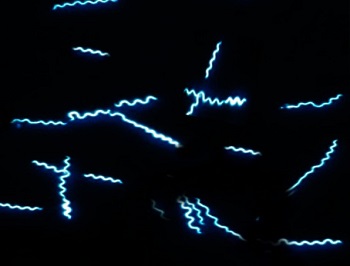Borrelia recurrentis - Lab Diagnosis, AST, Therapy
Lab Diagnosis of Borrelia recurrentis
The Laboratory diagnosis of Borrelia recurrentis begins with the collection of samples.
Specimen
Specimen/samples include:
peripheral blood (collected during fever, not during afrabile phase)
biopsy
joint fluid
CSF
Microscopy
Microscopy for Borrelia recurrentis diagnosis is done by wet mount preparation of blood and visualization by dark-field or phase-contrast microscope. Organisms are identified by their dashing movements often pushing RBC around
Borrelia recurrentis can also be detected by staining thick and thin films with Wright’s or Giemsa stains with a sensitivity of upto 70%.

Fig: dark-field microscopy of Borrelia recurrentis (Source: NCBI)
Culture
Because of complex nutritional requirements, long incubation time, and low sensitivity of culture, cultivation of Borrelia recurrentis is confined to research purposes.
Process
The culture of Borrelia recurrentis may be attempted. It is done by the procedure written below:
specimen inoculated into a tube of modified Kelly’s medium
incubated at 30-40°C for 12 weeks under microaerophilic condition
blind subcultures (0.1ml) are performed from the lower portion of broth to fresh media
cultures are examined by dark-field or fluorescence microscopy after staining with Acridine orange
Animal inoculation
It is done by inoculating a mouse intraperitoneally with 1-2ml of blood from infected patients. Blood is collected from the tail vein of mice after 1-10 days and examined for the presence of Borrelia recurrentis daily for 2 weeks.
Serodiagnosis
Serologic tests are not reliable for diagnosis because Borrelia recurrentis as it undergoes many antigenic shifts.
Molecular diagnosis
These methods have been used on blood, body fluids, and tissue specimens for diagnosis of Borrelia recurrentis
PCR
AST, Therapy of Borrelia recurrentis
Since difficult to culture, AST is not usually done
Tetracycline or erythromycin is most effective for the treatment of relapsing fever
Doxycycline is recommended for children and pregnant women
No vaccines are available.